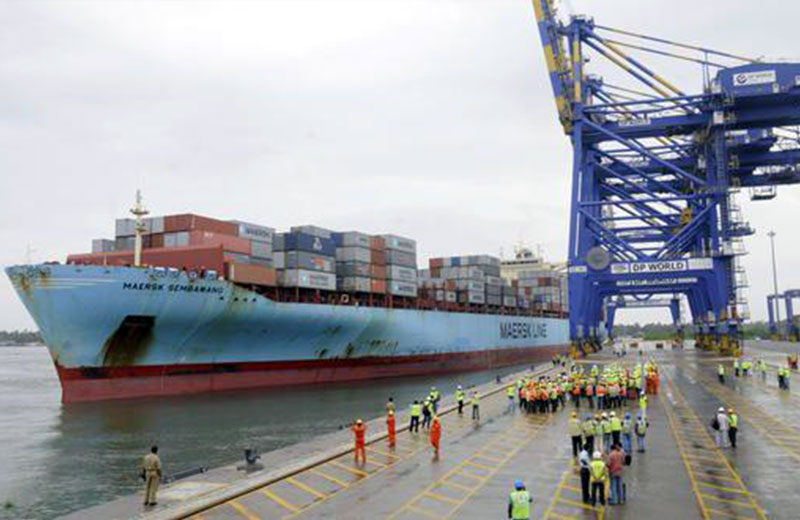September 22, 2020: Years of resentment over what they call as a “one-sided deal” has spilled out into the open with port unions urging the government to overhaul, novate or even scrap the license agreement with DP World for running the international container transhipment terminal (ICTT) at Cochin Port Trust.
The country’s first such terminal was envisaged to cut the dependence on neighbouring hub ports.
Port’s finances
The Cochin Port Joint Trade Union Forum (CPJTUF) has submitted a letter to the Shipping Ministry demanding among other issues, the need to incorporate a minimum guaranteed throughput (MGT) clause in the agreement, to safeguard the commercial and financial interests of Cochin Port Trust.
The move comes amidst indications that the DP World-owned India Gateway Terminal Pvt Ltd (IGTPL) which runs the ICTT, has started preliminary work on the second phase expansion of the project, which will further strain the Port Trust’s finances.
The Central government and Cochin Port Trust invested more than ₹2,000 crore on the project to provide basic infrastructure such as four-lane road, rail link and dredged the channel to 15.95 metres to accommodate 14.5-metre draft ships.
But, IGTPL “miserably failed” in utilising the facilities created with huge public funds, defeating the purpose of the national project and “ruined” the port’s financial stability, CD Nandakumar, general convenor of the Forum, alleged in the letter.
The ICTT deal, according to the Forum, has broken the back of the Port which spent ₹938.72 crore (excluding service tax/GST) since FY2011 for maintaining the navigability of the channel. The other “sacrifices” made by the Port Trust to make the project a success include granting 86 per cent concession in Vessel Related Charges (VRC) to help ICTT compete with Colombo port. This translated into a revenue loss of ₹461.97 crore over a ten-year period.
Revenue-sharing formula
The Forum said these facilitating measures did not yield any commensurate benefit to the Port Trust and the nation.
In FY20, the 1.2 million twenty-foot equivalent units (TEUs) capacity terminal handled 6.20 lakh TEUs of which a meagre 6 per cent or 36,183 TEUs were transhipment containers.
IGTPL is contractually mandated to share 33.3 per cent of its annual revenue with the Port Trust.
Since FY2011, IGTPL earned gross revenue of ₹2,318.38 crore, of which the shareable revenue portion was ₹1,986.32 crore. The Port Trust received ₹661.39 crore as its share of 33.3 per cent.
This came to only 28.53 per cent of gross revenue against the stipulated 33.3 per cent as IGTPL chose not to share 33.3 per cent on ₹332.06 crore (₹2,318.38-₹1,986.32) because of the ambiguity in revenue sharing clause in the license agreement, resulting in a short receipt of ₹110.58 crore, the Forum said.
‘Veto expansion’
“It is whimsical that the ambiguity in the license agreement made IGTPL free to determine the shareable and exclusive non-shareable revenue so that IGTPL is free to take decision on shareable revenue which is unquestionable,” the Forum said.
Given this background, it is necessary to review and arrive at a novated agreement by modifying several clauses to help the Port Trust “recoup its financial stability”.
Alleging that IGTPL has “violated” the license agreement and “vitiated” the project, the Forum urged the Ministry to veto the phase two expansion of ICTT and direct IGTPL to operate the existing facilities at full capacity utilisation, give “rational revenue return” to the Port Trust before embarking on the expansion plan and develop Vallarpadam as a container transhipment hub as planned, failing which the deal should be “terminated”.
IGTPL must be made liable to invest the entire project cost for Phase 2 including capital and maintenance dredging or the government should fund the dredging costs or evolve a mechanism by which all users of the port’s channel should share the cost proportionately, it said.
Source: Business Line






